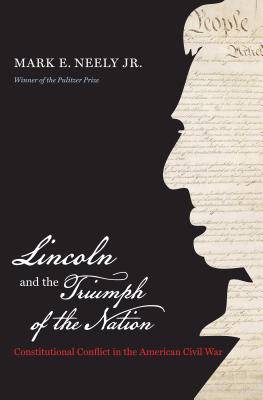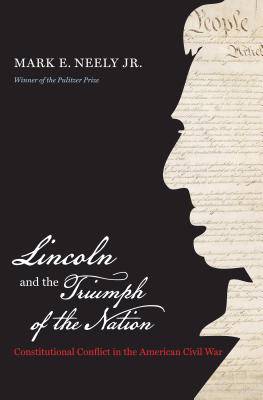
- Afhalen na 1 uur in een winkel met voorraad
- Gratis thuislevering in België vanaf € 30
- Ruim aanbod met 7 miljoen producten
- Afhalen na 1 uur in een winkel met voorraad
- Gratis thuislevering in België vanaf € 30
- Ruim aanbod met 7 miljoen producten
Zoeken
Lincoln and the Triumph of the Nation
Constitutional Conflict in the American Civil War
Mark E Neely
€ 49,95
+ 99 punten
Omschrijving
The Civil War placed the U.S. Constitution under unprecedented -- and, to this day, still unmatched -- strain. In Lincoln and the Triumph of the Nation, Pulitzer Prize-winning historian Mark Neely examines for the first time in one book the U.S. Constitution and its often overlooked cousin, the Confederate Constitution, and the ways the documents shaped the struggle for national survival.
Previous scholars have examined wartime challenges to civil liberties and questions of presidential power, but Neely argues that the constitutional conflict extended to the largest questions of national existence. Drawing on judicial opinions, presidential state papers, and political pamphlets spiced with the everyday immediacy of the partisan press, Neely reveals how judges, lawyers, editors, politicians, and government officials, both North and South, used their constitutions to fight the war and save, or create, their nation.
Lincoln and the Triumph of the Nation illuminates how the U.S. Constitution not only survived its greatest test but emerged stronger after the war. That this happened at a time when the nation's very existence was threatened, Neely argues, speaks ultimately to the wisdom of the Union leadership, notably President Lincoln and his vision of the American nation.
Previous scholars have examined wartime challenges to civil liberties and questions of presidential power, but Neely argues that the constitutional conflict extended to the largest questions of national existence. Drawing on judicial opinions, presidential state papers, and political pamphlets spiced with the everyday immediacy of the partisan press, Neely reveals how judges, lawyers, editors, politicians, and government officials, both North and South, used their constitutions to fight the war and save, or create, their nation.
Lincoln and the Triumph of the Nation illuminates how the U.S. Constitution not only survived its greatest test but emerged stronger after the war. That this happened at a time when the nation's very existence was threatened, Neely argues, speaks ultimately to the wisdom of the Union leadership, notably President Lincoln and his vision of the American nation.
Specificaties
Betrokkenen
- Auteur(s):
- Uitgeverij:
Inhoud
- Aantal bladzijden:
- 416
- Taal:
- Engels
- Reeks:
Eigenschappen
- Productcode (EAN):
- 9781469621845
- Verschijningsdatum:
- 1/02/2015
- Uitvoering:
- Paperback
- Formaat:
- Trade paperback (VS)
- Afmetingen:
- 142 mm x 226 mm
- Gewicht:
- 544 g

Alleen bij Standaard Boekhandel
+ 99 punten op je klantenkaart van Standaard Boekhandel
Beoordelingen
We publiceren alleen reviews die voldoen aan de voorwaarden voor reviews. Bekijk onze voorwaarden voor reviews.











